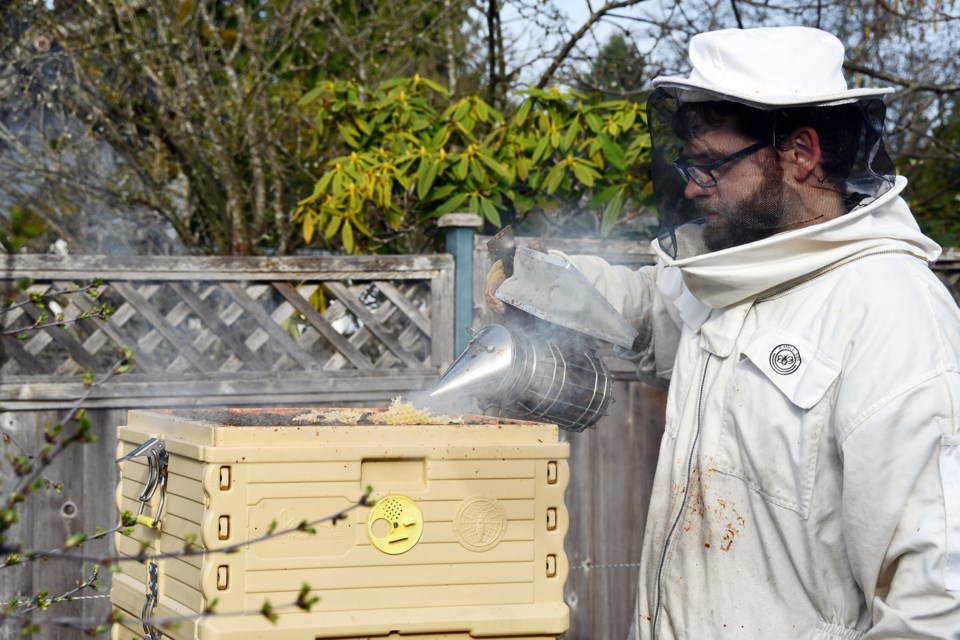In the backyard of the Coquitlam home that Thomas Drelich shares with this folks, honeybees from two colonies buzz around the two hives.
Drelich, a graduate of Dr. Charles Best Secondary and a refrigeration mechanic, suits up before he unhooks the double electric fencing wires to take a peek.
Inside, about 25,000 bees are busy at work making honey, which Drelich processes and consumes, and also gifts to friends and family.
Drelich is happy because the hives are thriving this spring — the first time after six disappointing winters.
Drelich learned how to keep bees as a child while visiting his grandfather in Poland. He also passed the craft to his son, Drelich’s dad.
“I enjoy being around them,” Drelich told the Tri-City News today, April 4. “Beekeeping is an oddly relaxing thing. It’s calming and they’re very docile.”
Drelich hadn't any complaints from neighbours about the operation until last summer when hornets and wasps flared up during a hot spell, he said.
Neighbour Susan Hopkins, an avid gardener, told the Tri-City News that she was stung repeatedly last summer by Drelich's new set of "aggressive" honeybees, including on the neck; her visitors have also been stung.
Last October, she asked Drelich to relocate the hives after they continued to cause problems.
When he didn't comply, she called municipal bylaw officers.
Now, the City of Coquitlam is telling the family to remove the hives from the property or face a $150 fine; Drelich has until April 19 to get them off the Wilmot Street property, which is about a minute's walk from Mundy Park.
In an email to the Tri-City News, Coquitlam’s environment manager Caresse Selk said beekeeping is restricted through the city’s zoning bylaw to a limited number of agricultural and residential parcels in the A3 (agriculture) and RS2 (single-family) zones — typically at least an acre in size.
Drelich’s land, she said, is zoned RS1 and, as such, does not allow beekeeping.
In correspondence with Drelich, she elaborated that Coquitlam is a Bear Smart community: Staff work proactively to reduce human–wildlife conflict and prevent attracting wildlife into neighbourhoods. As well, she wrote, Coquitlam has had very limited interest from the public to amend the bylaw.
“Unfortunately, bee hives can be highly attractive to wild animals such as bears as well as rodent pests,” she wrote to Drelich, adding, “Staff analyzed the feasibility of expanding the keeping of bees and backyard chickens to residential neighbourhoods in 2017, but the risk of attracting predatory wildlife and pests was found to be too significant and the zoning bylaw restrictions were maintained.”
Still, Drelich argues the bylaw is outdated as other Metro Vancouver municipalities such as Port Coquitlam, Port Moody, Burnaby and Vancouver allow urban beekeeping.
Beekeeping, he states, is not only good for the environment, as bees pollinate up to a 5 km radius, but it also contributes to food security — a need especially as grocery bills skyrocket post–pandemic.
And, he contended, his operation is not for commercial use.
“I want to see some changes to this bylaw,” he said. “Coquitlam appears to be an outlier regionally.”
In addition, he pointed to places where beekeeping is happening and is not consistent with the bylaw, such as the roof of Coquitlam Centre mall.
“It would be good to have a bylaw that allows urban beekeeping with proper precautions like set distances and limits on hives,” Drelich said.
“Environmental stewards are important for our community. My grandfather said that when the last honeybee was gone, we would be in trouble.”
📣 SOUND OFF: Do you think about urban beekeeping should be allowed in Coquitlam? Email your comments to [email protected].





